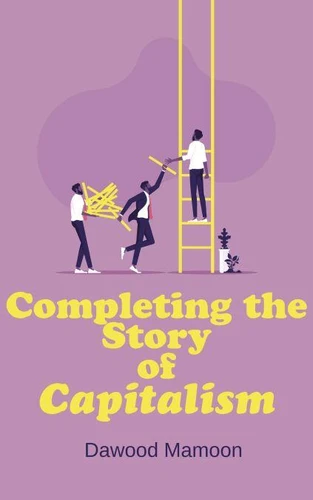Completing the Story of Capitalism
Par :Formats :
Actuellement indisponible
Cet article est actuellement indisponible, il ne peut pas être commandé sur notre site pour le moment. Nous vous invitons à vous inscrire à l'alerte disponibilité, vous recevrez un e-mail dès que cet ouvrage sera à nouveau disponible.
Disponible dans votre compte client Decitre ou Furet du Nord dès validation de votre commande. Le format ePub est :
- Compatible avec une lecture sur My Vivlio (smartphone, tablette, ordinateur)
- Compatible avec une lecture sur liseuses Vivlio
- Pour les liseuses autres que Vivlio, vous devez utiliser le logiciel Adobe Digital Edition. Non compatible avec la lecture sur les liseuses Kindle, Remarkable et Sony
 , qui est-ce ?
, qui est-ce ?Notre partenaire de plateforme de lecture numérique où vous retrouverez l'ensemble de vos ebooks gratuitement
Pour en savoir plus sur nos ebooks, consultez notre aide en ligne ici
- FormatePub
- ISBN8231207114
- EAN9798231207114
- Date de parution05/06/2025
- Protection num.pas de protection
- Infos supplémentairesepub
- ÉditeurWalzone Press
Résumé
Inspired by the analytical frameworks of J. Bradford DeLong in Slouching Towards Utopia, this work extends and deepens the critique by arguing that what contemporary capitalism lacks is cultural anchoring. Global prosperity, achieved through technological revolutions and financial liberalization, has not prevented the emergence of identity politics, political polarization, or institutional fragility.
In Pakistan, India, the United States, and beyond, wealth has grown while social cohesion has frayed. Dr. Mamoon brings to this conversation a unique perspective: one grounded in Pakistan's complex economic and cultural evolution since the 1980s. He shows how liberalization without identity integration creates backlash; how periods of economic stability coincide with cultural clarity; and how national development must emerge from cultural legitimacy rather than imposed abstraction.
Together, Dr. Mamoon and Chat GPT present a new vision of capitalism-one where markets are embedded in society, where financial innovation respects local values, and where growth is judged not only by output but by dignity, belonging, and shared meaning.
In Pakistan, India, the United States, and beyond, wealth has grown while social cohesion has frayed. Dr. Mamoon brings to this conversation a unique perspective: one grounded in Pakistan's complex economic and cultural evolution since the 1980s. He shows how liberalization without identity integration creates backlash; how periods of economic stability coincide with cultural clarity; and how national development must emerge from cultural legitimacy rather than imposed abstraction.
Together, Dr. Mamoon and Chat GPT present a new vision of capitalism-one where markets are embedded in society, where financial innovation respects local values, and where growth is judged not only by output but by dignity, belonging, and shared meaning.
Inspired by the analytical frameworks of J. Bradford DeLong in Slouching Towards Utopia, this work extends and deepens the critique by arguing that what contemporary capitalism lacks is cultural anchoring. Global prosperity, achieved through technological revolutions and financial liberalization, has not prevented the emergence of identity politics, political polarization, or institutional fragility.
In Pakistan, India, the United States, and beyond, wealth has grown while social cohesion has frayed. Dr. Mamoon brings to this conversation a unique perspective: one grounded in Pakistan's complex economic and cultural evolution since the 1980s. He shows how liberalization without identity integration creates backlash; how periods of economic stability coincide with cultural clarity; and how national development must emerge from cultural legitimacy rather than imposed abstraction.
Together, Dr. Mamoon and Chat GPT present a new vision of capitalism-one where markets are embedded in society, where financial innovation respects local values, and where growth is judged not only by output but by dignity, belonging, and shared meaning.
In Pakistan, India, the United States, and beyond, wealth has grown while social cohesion has frayed. Dr. Mamoon brings to this conversation a unique perspective: one grounded in Pakistan's complex economic and cultural evolution since the 1980s. He shows how liberalization without identity integration creates backlash; how periods of economic stability coincide with cultural clarity; and how national development must emerge from cultural legitimacy rather than imposed abstraction.
Together, Dr. Mamoon and Chat GPT present a new vision of capitalism-one where markets are embedded in society, where financial innovation respects local values, and where growth is judged not only by output but by dignity, belonging, and shared meaning.



